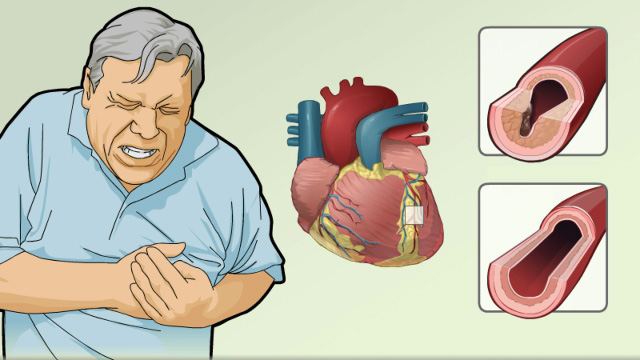Angina - discharge
Angina is a type of chest discomfort due to poor blood flow through the blood vessels of the heart muscle. This article discusses how to care for yourself when you leave the hospital.
When You're in the Hospital
You were having angina. Angina is chest pain, chest pressure, often associated with shortness of breath. You had this problem when your heart was not getting enough blood and oxygen. You may or may not have had a heart attack.
Shortness of breath
Most people take breathing for granted. People with certain illnesses may have breathing problems that they deal with on a regular basis. This arti...

Heart attack
Most heart attacks are caused by a blood clot that blocks one of the coronary arteries. The coronary arteries bring blood and oxygen to the heart. ...

What to Expect at Home
You may feel sad. You may feel anxious and that you have to be very careful about what you do. All of these feelings are normal. They go away for most people after 2 or 3 weeks.
You may also feel tired when you leave the hospital. You should feel better and have more energy within 5 weeks after you are discharged from the hospital.
Activity
Know the signs and symptoms of angina:
- You may feel pressure, squeezing, burning, or tightness in your chest. You may also have pressure, squeezing, burning, or tightness in your arms, shoulders, neck, jaw, throat, or back.
- Some people may feel discomfort in their back, shoulders, and stomach area.
- You may have indigestion or feel sick to your stomach. You may feel tired and be short of breath, sweaty, lightheaded, or weak. You may have these symptoms during physical activity, such as climbing stairs, walking uphill, lifting, and engaging in sexual activity.
- You may have symptoms more often in cold weather. You can also have symptoms when you are resting, or when wake you up from your sleep.
Angina causes and symptoms - Animation
Angina, or angina pectoris, is temporary chest pain or a sensation of pressure that occurs when the heart’s need for oxygen is not satisfied by the amount of blood supplied to the heart. Blood flow can be limited when the arteries are narrowed by atherosclerosis, or because of coronary artery spasms. Symptoms of angina may also include discomfort in the shoulders, inside the arms, through the back and in the throat, jaw, or teeth. Angina due to atherosclerosis usually occurs during physical exertion or emotional distress, or at rest if the artery is narrowed by more than 70%.
Ask your health care provider how to treat your chest pain when it happens.
Chest pain
Angina is a type of chest discomfort due to poor blood flow through the blood vessels of the heart muscle. This article discusses how to care for yo...
Read Article Now Book Mark ArticleTake it easy at first. You should be able to talk easily when you are doing any activity. If you cannot, stop the activity.
Ask your provider about returning to work and what type of work you will be able to do.
Your provider may refer you to a cardiac rehabilitation program. This will help you learn how to slowly increase your exercise. You will also learn how to take care of your heart disease.
Take care of your heart disease
A heart attack occurs when blood flow to a part of your heart is blocked long enough that part of the heart muscle is damaged or dies. Starting a re...

Diet and lifestyle
Try to limit how much alcohol you drink. Ask your provider when it is OK to drink, and how much is safe.
Don't smoke cigarettes. If you do smoke, ask your provider for help quitting. Don't let anyone smoke in your home.
Learn more about what you should eat for a healthier heart and blood vessels. Avoid salty and fatty foods. Stay away from fast-food restaurants. Your provider can refer you to a dietitian, who can help you plan a healthy diet.
Healthier heart
Your body needs cholesterol to work well. But cholesterol levels that are too high can harm you. In the US, blood cholesterol is most often measured...


Healthy diet
For a healthy diet, replace unhealthy and fattening foods with healthier alternatives, such as fresh fruits and vegetables.
Try to avoid stressful situations. If you feel stressed or sad, tell your provider. They can refer you to a counselor.
Ask your provider about sexual activity. Men should not take medicines or any herbal supplements for erection problems without checking with their provider first. These medicines are not safe when used with nitroglycerin.
Taking your heart medicines
Have all of your prescriptions filled before you go home. You should take your medicines the way you have been told. Ask your provider if you can still take any other prescription medicines, herbs, or supplements you have been taking.
Take your medicines with water or juice. Do not drink grapefruit juice (or eat grapefruit), since these foods may change how your body absorbs certain medicines. Ask your provider or pharmacist about this.
People who have angina often receive the medicines below. But sometimes these medicines may not be safe to take. Talk with your provider if you are not already taking one of these medicines:
- Antiplatelet medicines (blood thinners), such as aspirin, clopidogrel (Plavix), prasugrel (Efient), or ticagrelor (Brilinta)
Aspirin
Current guidelines recommend that people with coronary artery disease (CAD) receive antiplatelet therapy with either aspirin or clopidogrel. Aspirin ...
 ImageRead Article Now Book Mark Article
ImageRead Article Now Book Mark ArticleClopidogrel
Platelets are small particles in your blood that your body uses to form clots and stop bleeding. If you have too many platelets or your platelets st...
 ImageRead Article Now Book Mark Article
ImageRead Article Now Book Mark Article - Other medicines, such as warfarin (Coumadin), to help keep your blood from clotting
Warfarin
Warfarin is a medicine that makes your blood less likely to form clots. It is important that you take warfarin exactly as you have been told. Chang...
Read Article Now Book Mark Article - Beta-blockers and ACE inhibitor medicines, to help protect your heart
ACE inhibitor
Angiotensin-converting enzyme (ACE) inhibitors are medicines. They treat heart, blood vessel, and kidney problems.
 ImageRead Article Now Book Mark Article
ImageRead Article Now Book Mark Article - Statins or other medicines to lower your cholesterol
Statins or other medicines to lower you...
Your body needs cholesterol to work properly. But extra cholesterol in your blood causes deposits to build up on the inside walls of your blood vess...
 ImageRead Article Now Book Mark Article
ImageRead Article Now Book Mark Article - Calcium-channel blockers
- Nitroglycerin
Never just stop taking any of these medicines. Don't stop taking any other medicines you may be taking for diabetes, high blood pressure, or any other medical problems.
If you are taking a blood thinner, you may need to have extra blood tests to make sure your dose is correct.
When to Call the Doctor
Contact your provider if you feel:
- Pain, pressure, tightness, or heaviness in the chest, arm, neck, or jaw
- Shortness of breath
- Gas pains or indigestion
- Numbness in your arms
- Sweaty, or if you lose color
- Lightheaded
Changes in your angina may mean your heart disease is getting worse. Contact your provider if your angina:
- Becomes stronger
- Occurs more often
- Lasts longer
- Occurs when you are not active or when you are resting
- If medicines do not help ease your angina symptoms as well as they used to
Reviewed By
Thomas S. Metkus, MD, Assistant Professor of Medicine and Surgery, Johns Hopkins University School of Medicine, Baltimore, MD. Also reviewed by David C. Dugdale, MD, Medical Director, Brenda Conaway, Editorial Director, and the A.D.A.M. Editorial team.
Boden WE. Angina pectoris and chronic ischemic heart disease. In: Goldman L, Cooney KA, eds. Goldman-Cecil Medicine. 27th ed. Philadelphia, PA: Elsevier; 2024:chap 62.
Bonaca MP, Sabatine MS. Approach to the patient with chest pain. In: Libby P, Bonow RO, Mann DL, Tomaselli GF, Bhatt DL, Solomon SD, eds. Braunwald's Heart Disease: A Textbook of Cardiovascular Medicine. 12th ed. Philadelphia, PA: Elsevier; 2022:chap 35.
Gulati M, Levy PD, Mukherjee D, et al. 2021 AHA/ACC/ASE/CHEST/SAEM/SCCT/SCMR Guideline for the evaluation and diagnosis of chest pain: executive summary: A report of the American College of Cardiology/American Heart Association Joint Committee on Clinical Practice Guidelines. Circulation. 2021;144(22):e368-e454. PMID: 34709928 pubmed.ncbi.nlm.nih.gov/34709928/.
Virani SS, Newby LK, Arnold SV, et al. 2023 AHA/ACC/ACCP/ASPC/NLA/PCNA Guideline for the management of patients with chronic coronary disease: A report of the American Heart Association/American College of Cardiology Joint Committee on Clinical Practice Guidelines. Circulation. 2023;148(9):e9-e119. PMID: 37471501 pubmed.ncbi.nlm.nih.gov/37471501/.


 All rights reserved.
All rights reserved.